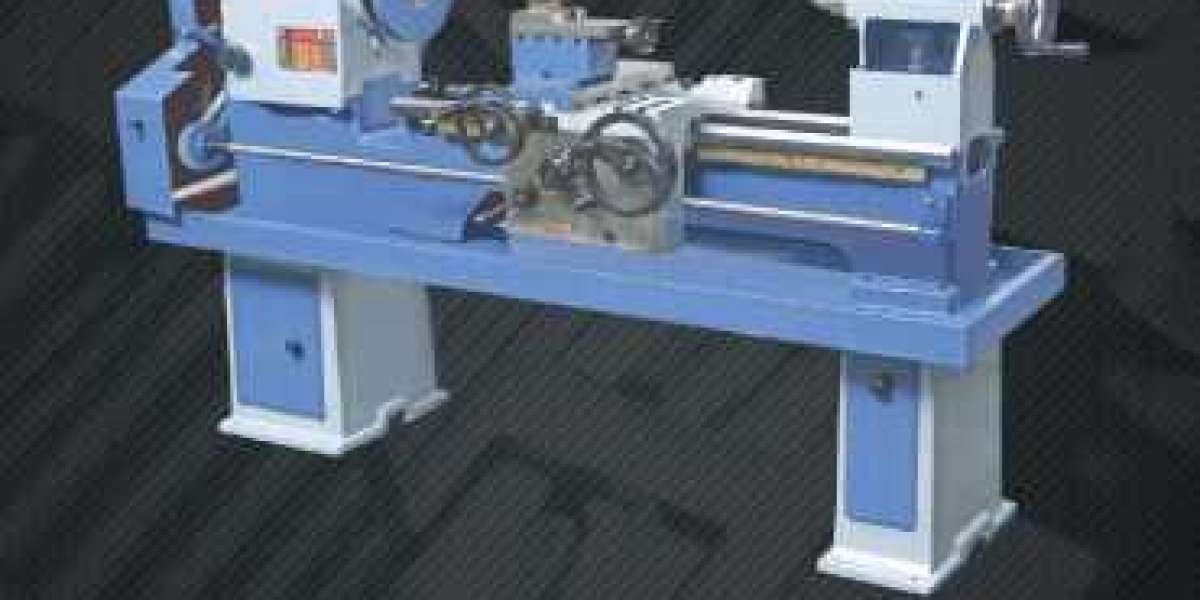A Lathe Machine is one of the most important and widely used tools in the manufacturing world. It plays a key role in shaping, cutting, and forming materials into precise components. From metal rods and plastic cylinders to wooden shafts, lathe machines help create accurate parts used in industries like automotive, aerospace, and engineering.
What sets a lathe machine apart is its ability to rotate the workpiece while cutting tools shape it into the required form. This simple yet powerful function makes it essential for small workshops and large factories alike. Whether you need a basic manual lathe or an advanced geared machine, there’s a solution for every industrial need.
What Is a Lathe Machine and How Does It Work?
A lathe machine spins a piece of material so you can easily cut, drill, shape, or smooth it. Imagine a potter spinning a wheel and shaping clay with their hands—that’s exactly how a lathe works, but with metal or wood and cutting tools.
A lathe machine primarily secures a work piece and rotates it, allowing cutting tools to shape it accurately into the required design. It can produce cylindrical parts, rings, threads, cones, and much more. Because of its precise control, it is widely used in mechanical, automobile, and even art industries.
Different Types of Lathe Machines You Should Know
Various lathe machine types have evolved over time to meet diverse industrial requirements. Each type is designed for specific tasks and materials. Here are the most common types:
1. Engine Lathe (Center Lathe)
This is the most commonly used lathe machine. It is versatile, easy to operate, and ideal for general purpose turning.
2. Turret Lathe
Turret lathes are made for repeated work and can quickly switch between different tools. It shortens production timelines and enhances efficiency for large-scale manufacturing.
3. Bench Lathe
As the name suggests, this lathe is small enough to be mounted on a bench. Ideal for small jobs and used mainly in tool rooms.
4. CNC Lathe
The modern upgrade. CNC (Computer Numerical Control) lathes are automated and allow complex operations with high precision. You just input the code, and the machine does the rest.
5. Special Purpose Lathes
These are designed for tasks like crankshaft turning, camshaft turning, or specific industrial requirements. They are usually custom-built.
6. Geared Lathe Machine
This one deserves special attention, and we’ll cover it in detail later. It uses gear mechanisms to adjust speed and torque, making it powerful and efficient.
Knowing these types helps businesses choose the right machine for their industry and workload. Top Lathe Machine Manufacturers offer multiple variants for different needs.
Common Applications: What Is a Lathe Machine Used For?
Lathe machines have hundreds of applications. Here are some industries and tasks where they’re most commonly used:
- Automobile Sector: Used to manufacture components like shafts, gear bases, and essential engine parts.
- Aerospace Industry: Ideal for accurately machining aluminum and titanium components.
- Woodworking: Artistic wood shaping, furniture legs, and decorative items.
- Metalworking: Performing operations like cutting, facing, turning, threading, and grooving on metal rods.
- Jewelry Making: Mini lathes are used for shaping rings and ornaments.
- Repair Shops: Modifying or rebuilding worn-out parts.
I remember visiting my uncle’s metal workshop as a child. Watching a lathe machine carve a perfect thread on a raw metal rod was mesmerizing. He once told me, “A lathe can give life to dead metal.” That stuck with me.
Geared Lathe Machines: Features and Advantages
Among all the types, geared lathe machines have become extremely popular in industries that require power and speed control. Let’s look at why:
What Makes It Different?
Geared lathes rely on gearboxes instead of pulleys, offering improved torque handling and more consistent performance compared to traditional belt-driven models.
Advantages:
- High Precision: Smooth gear shifting offers better dimensional accuracy.
- Better Load Handling: Suitable for tough metals like steel and cast iron.
- Speed Variability: Easy to change spindle speed without stopping the machine.
- Long Life: Stronger build means less maintenance and better durability.
Ideal for Heavy Duty Work: Perfect for large-scale industrial operations.
In factories I’ve visited across India, Lathe Machine Manufacturers in India often recommend geared machines for businesses dealing in automotive or large component production. And they’re right—these machines handle the heavy stuff with ease.
How to Choose the Right Lathe Machine for Our Industry
Choosing the right lathe machine is more than just picking the latest model. Use this simple guide to help you make an informed choice:
1. Understand Your Material
Are you working with metal, wood, or plastic? Each material demands different torque and precision.
2. Volume of Work
If you produce in bulk, a CNC or turret lathe may be better. For occasional jobs, a bench or engine lathe might suffice.
3. Available Space
Larger machines need more room. Always consider the layout of your workshop before buying.
4. Budget
Higher automation means higher cost. But it also means faster ROI. Think long-term.
5. After-Sales Support
Always buy from reputed Lathe Machine Suppliers. Trustworthy service today can prevent major issues in the future.
I once helped a small factory owner upgrade from a belt-driven lathe to a geared lathe. Though hesitant at first due to cost, he later thanked me. “My output doubled,” he said. "And my staff spends less time adjusting the settings."
What’s the Difference Between CNC and Manual Lathe Machines?
Let’s clear up the confusion between CNC and manual lathe machines.
- Manual Lathe:
- Operator controls everything.
- Great for one-off jobs and custom work.
- Requires skilled labor.
- Cheaper to purchase.
CNC Lathe:
- Controlled by computer.
- Ideal for mass production.
- Higher precision, less waste.
- More expensive, but less human error.
Think of manual as handwriting a letter and CNC as printing it from a computer. Both have their place. However, in industries that prioritize speed and precision, CNC machines typically offer a more reliable and efficient solution.
Still, many Lathe Machine Manufacturers offer hybrid models with both manual and CNC controls, giving you flexibility.
Conclusion
The Lathe Machine is more than just a tool—it’s the backbone of many industries. From simple household repairs to complex aerospace parts, its role cannot be overstated. With different types like bench, turret, engine, and CNC, there’s a lathe for every job.
Geared lathe machines bring even more power and precision to the table, making them ideal for demanding tasks. Choosing the right machine involves knowing your needs, materials, and long-term goals. And always trust reliable Lathe Machine Suppliers and Lathe Machine Manufacturers in India to get you the right equipment.
Having seen lathe machines at work, from dusty rural workshops to gleaming industrial plants, I can say one thing for sure: A good lathe machine doesn’t just cut metal—it builds futures.








